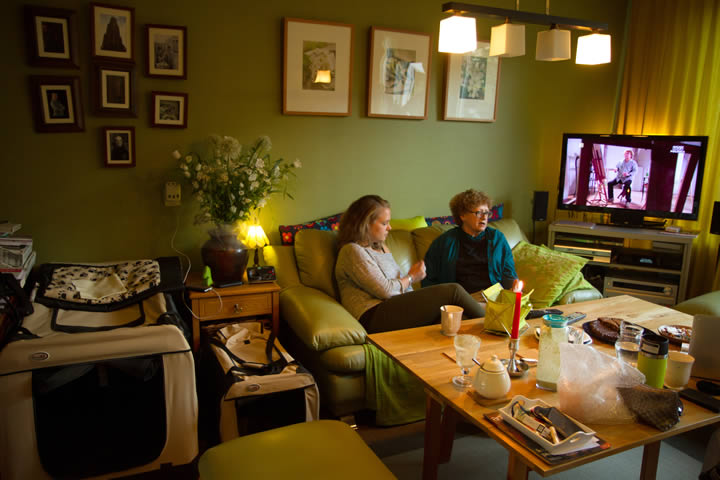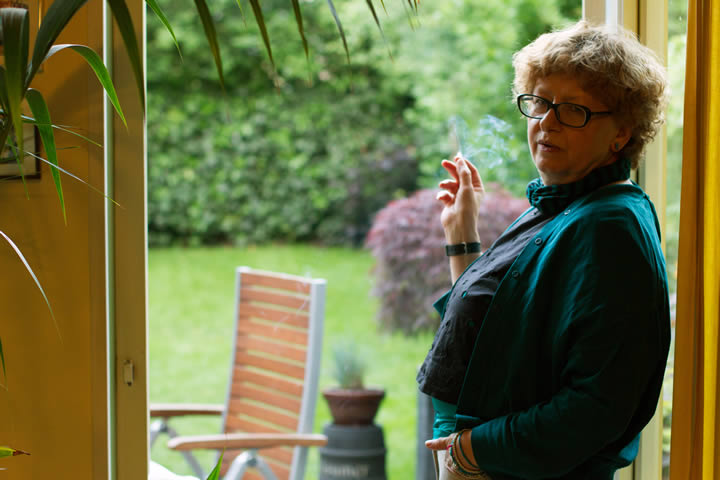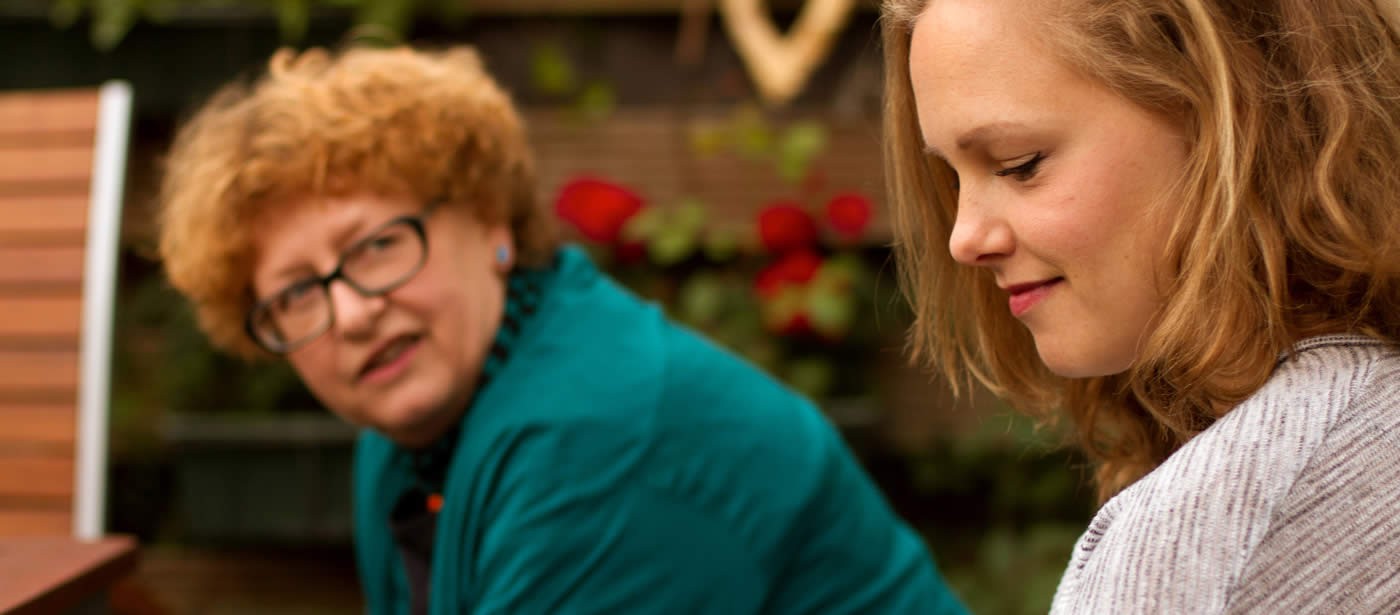Ewa Chojecka (31) found out she was a refugee when a camera crew came by the house she grew up in, in Utrecht. Ewa was nine years old and Dutch television was making a documentary featuring her mother. She heard her mother tell the television lady her father had spent time in prison back in Poland. “Daddy didn’t do anything wrong, did he?”, her older sister asked mother afterwards. “No, daddy did something good, but other people didn’t understand”, their mother replied. And that was pretty much the end of that.

Ewa is now about the same age her mother was when she came to the Netherlands. She works as an online project coordinator at Disney Benelux, sings in a vocal group she loves to perform with, and claims she’s ‘very Dutch’. She doesn’t remember anything about her life as a small child in Poland, as she was only three years old when they left. “I don’t even know exactly why we left”, she says, sitting on the couch in the house she grew up. “Well, there was communism.” A radiant smile seems to serve as an apology: “I’m really bad at history. I know my dad was in prison. And it was really hard to find food. You needed coupons for those, right?” She casts a quick glance at her mother, who’s smoking in the doorway that leads to the garden. Her mother nods absently. “We went on a sort of vacation and never returned”, Ewa says.
Ewa’s mother had told her side of the story during a previous meeting, alone.
WHAT EWA DOESN’T KNOW
Warsaw, 1979. I’m studying Polish language and literature, and cultural anthropology. I have a sofabed with a hidden compartment that’s stuffed with books, leaflets, brochures, each and every one of them illegal. Books on civil rights, brochures on what to do if you’re arrested. They are all printed by NOWA, the underground publishing house of Miroslaw Chojecki. Miroslaw is one of the most well-known dissidents in Poland, arrested dozens of times, and co-founder of KOR, the Workers’ Defence Committee.
I’m not an activist myself, let alone a hero. The people at KOR and NOWA are. They do important things to change Poland. I merely move in the same circles. I fell in love with Slawomir Chojecki, Miroslaw’s brother, at a student party. Slawomir helps his brother by smuggling paper and ink and distribute illegal brochures, among other things.
We marry in 1980 so we can get a house. The rules determine your life’s path: without a marriage certificate people cannot apply for an apartment. Slawomir now works at the new trade union Solidarność, which emerged from the workers’ strike committees and KOR. Millions of people join Solidarność. And, more importantly: they are heard. The government even meets their demands. Everyone is optimistic, euphoric even. There is a future. It’s in that period we have our first daughter, Ola.
Ola is just four months old when there’s a loud banging on the door. It’s December 14, 1981. My father-in-law stumbles inside. ‘We’re at war!’, he yells. Thousands of people have been arrested that night – or ‘internalized’ as they prefer to call it – and my father-in-law is afraid Slawomir is next. The government has imposed martial law. Trade union Solidarność is banned, and reforms are revoked. Luckily and by sheer coincidence my brother-in-law is in France, so he’s safe. But my husband is right here, at home. We panic – what to do? After all, my husband works for Solidarność and he’s Miroslaw’s brother. Miroslaw is a famous symbol of the resistance.
He doesn’t come home that night. I know what happened, even though the police won’t tell me anything.
Tanks patrol the streets. Slawomir decides to see how the union office is doing. He doesn’t come home that night. I know what happened, even though the police won’t tell me anything. I worry about my husband – please don’t let them take him to Russia! – but the strange thing is, it was a rather wonderful period as well. Being related to a political prisoner means help is never far away. Every day, our tiny two-room apartment is chock full of friends, family, and even people I’ve never seen before. When Ola is struck by pneumonia, a pediatrician shows up at our doorstep instantly. Selflessly, she comes by every day to see how the child is doing. Factory workers even stop by to donate money.
After two weeks I can finally visit Slawomir in prison. There they tell me the authorities and other members of the resistance have advised him to leave the country. I’m furious. Nobody has passports at home. You might be able to get one for individual journeys, but that usually doesn’t apply to black-listed people like dissidents or suspects. But now all of a sudden we’re free to leave. It’s pure blackmailing! ‘Absolutely not’, I say to my husband. ‘Of course not, that’s what I’ve told them’, he replies. Poland is our country. They cannot make us leave.
Then after four months, there he is again, set free without notice. He tries to get back to work, but Solidarność has gone underground. Although Miroslaw still sends us books and leaflets to distribute, any form of organized resistance has disappeared. Many people have fled or are in prison.

I become pregnant again. Twins Ewa and Piotr are born, god help us. Raising one child under martial law was a hard, but with two extra babies we have nothing. We live on the ninth floor. There are two elevators, both of which are often out of service. Every morning I go down all those flights of stairs with our stroller and three children to stand in line for food at eight a.m. My neighbor takes my place at noon. I’m exhausted. Organizing groceries – that’s what we call it – is so utterly time and energy-comsuming. Our parents are a great help, they are. But it’s not enough. I believe I died a little when the twins were born.
There’s more than a shortage of food. It’s like there’s a net closing in on us. A neighboring policeman starts paying us unannounced ‘visits’, and we’re given a phone out of the blue. Why us? Nobody has a phone. They probably hope to be able to listen in on conversations with Miroslaw from Paris. And my husband can’t get a job anywhere. Not with that last name.
My husband tentatively touches on leaving the country, but I refuse. It’s out of the question. The ties with my country, family, and friends are simply too strong. I can’t imagine a life anywhere but in Poland.
But then in 1984, priest Jerzy Popieluszko murdered by the secret service. Popieluszko was a man of importance; he had done a lot for Solidarność. I loved him, and I’m not even a catholic. His death is followed by the Chernobyl disaster in Ukraine two years later. Polish state television tells us everything’s fine, but on Western European radio – illegal, but available – we hear the radiation is extremely dangerous.
What is happening in my country is evil, and these two events make me realize that. I worry about my children. I don’t want them to grow up in a country that thrived on lies, fear, and distrust. I want them to grow up to become honest, fair people, but it’s exactly these people that won’t manage in Poland.
For seven months I cry, all the while postponing our departure.
We decide Slawomir will travel to Western Europe to make a living, and I will ‘visit’ him with the children at a later date. Deep down I know it won’t be a mere visit, but I lie to myself to avoid thinking about the awful truth. For seven months I cry, all the while postponing our departure. My parents will see me for the very last time and I will take their grandchildren from them. Who am I to make that decision? My sweet, sweet parents.
My father is a firm communist. The dividing line of Poland cuts right through our family: my parents-in-law are famous anti-communists, my own family is communist. But they respect one another. Both families want what’s best for Poland on both sides of the barricades. You don’t betray your own country, says my father. And now I am about to do exactly that. His own daughter, on the run. Still, there are no reproaches: my parents do whatever they can to help me. But it’s horrible.
I secretly hope Ola, Piotr, Ewa and I will not get the required travel documents, but it’s conspicuously easy. They’d love to see us go in Poland. We leave from the airport at six a.m., and many friends and family members have come to say goodbye. Tensed up from stress, fear, and sadness I say goodbye knowing I will never see any of them again.
There’s a group of people at Schiphol Airport waiting for us, too. They are Dutch friends who helped my husband, some of whom I still know from our trips back in the seventies. They carry balloons, cake, and stuffed animals for the children. It’s unbelievably sweet, but I don’t notice anything. We go to the house of one of the Dutch people – I don’t even know who they are – and put Ewa, Piotr, and Ola with the other kids. Within an hour after our arrival I hear Ewa utter a Dutch word! I myself barely know where I am, who I am, I want to die. But they have started their new lives.
Ewa doesn’t know any of that. Mirka never told her this story. Ewa’s parents felt children had to be protected from the past. In turn, Ewa doesn’t ask about it for fear of emotionally burdening her mother. Hesitantly, without looking at her mother, Ewa says: “Actually, maybe I’m fine the way it is. I have a great life here, and I am thankful they have come to the Netherlands. I wouldn’t mind hearing the facts, but inevitably that would also bring back all the emotions. Then I’d rather not hear the story at all. Not yet, anyway. It’s still to difficult.” She laughs, because it softens her words.
WHAT EWA KNOWS
There was fear in the Netherlands as well. Poverty, unemployment and red tape paralyze Mirka. She describes her feelings stressing every word: “What. To. Do. Now.” It starts upon arrival, when Mirka finds out Slawomir’s request for asylum was denied. After two years and many complicated procedures, they are granted permanent residence after all. Mirka start working at a daycare center, her husband at Douwe Egberts. But after three months they receive bad news yet again: they’re not allowed to work. They have to pay back their salaries and must apply for welfare. Mirka is desperate. “These rules made no sense! Where on earth did I end up?” They file a lawsuit that goes up to the Supreme Court. They win, and the rules are changed. But it’s a long time before Mirka finds a new job. There’s the language barrier, and since Polish immigrants are not considered a ‘recognized minority’ the employment office didn’t help her to find work ‘like they did for other foreigners’.
“My mother is who she is because of what she’s been through. At times, it’s hard for me to understand her”
Ewa’s parents get a divorce when she is twelve. Ewa’s father returns to Poland to look for work to support his children, but to no avail. Without child support, her mother tries to make ends meet in the Netherlands by working as an interpreter and translator. The children grow up as their mother tries not to collapse. Ewa: “Believe me, you notice when your mother is not feeling well. It took quite a while. I think until I turned twenty, and after that it was on and off. It was only five years ago that she started doing much better.” She smiles at her mother, apologetically. Mirka nods.

“My mother is who she is because of what she’s been through. At times, it’s hard for me to understand her”, Ewa says. “Like my urge to stock up on gorceries?”, her mother inquires. Ewa snickers. “For example. But I also think you’re quite negative. It’s something we have fought over often. I like to stress the positive, but you only see the negative.” Mirka exhales smoke into the garden. “Unfortunately, I have to agree. That’s how the Polish are. We have gotten used to that double life: we did what we had to do but deep down we rejected everything – no, no, no.” She stops to think. “Maybe I’m even more negative because of my personal experiences. What can I say? I’ve had a tough life.” Ewa: “And that’s okay! But you might want to try and look on the bright side of things a bit more, because you’re doing really well. You live in a beautiful country, you have a boyfriend, and a job. I find it hard to deal with that negativity, so sometimes I take a step back.”
Her mother puts out her cigarette. “You see,” she says almost triumphantly, “I’ve been too lenient on them.” Smiling: “They’ve had too much freedom to make their own choices.”